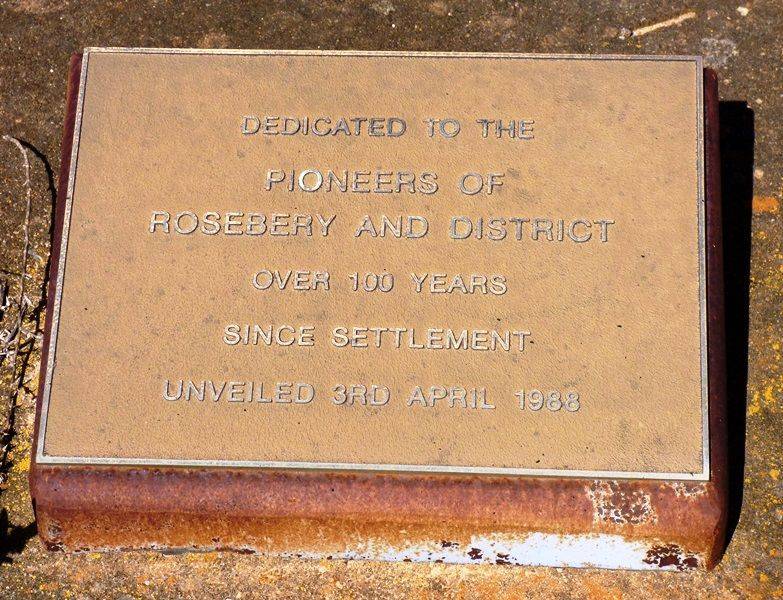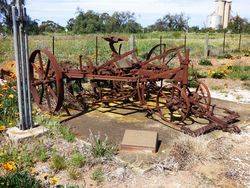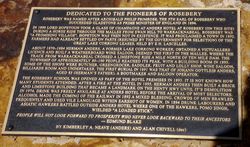
Pioneers of Rosebery & DistrictPrint Page 
Location
| Address: | Windy Ridge Road, Rosebery, 3395 |
|---|---|
| State: | VIC |
| Area: | AUS |
| GPS Coordinates: | Lat: -35.834146 Long: 142.421811 Note: GPS Coordinates are approximate. |
Details
| Monument Type: | Monument |
|---|---|
| Monument Theme: | Landscape |
| Sub-Theme: | Settlement |
Dedication
| Actual Monument Dedication Date: | Sunday 3rd April, 1988 |
|---|
Plaque:
Dedicated to the pioneers of Rosebery and District over 100 years since settlement
Unveiled 3rd April 1988
Plaque on machinery:
Dedicated to the pioneers of Rosebery
Rosebery was named after Archibald Philip Primrose, the 5th Earl of Rosebery who succeeded Gladstone as Prime Minister of England in 1894.
1890 Lord Hopetoun took a glass of champagne at Anders Hotel at Rosebery (on this site) during a horse ride through the Mallee from Swan Hill to Warracknabeal. Rosebery was "a promising village". Hopetoun was then not in existence. It was proclaimed a town in 1892. Farmers had already settled on parts (resumed by the Government for selection) of the Great Lake Corrong leases, held by E. H. Lascelles.
About 1870 - 1884 Herman Anders, a former Lake Corrong worker, obtained a victuallers licence and built a weatherboard wine saloon, deemed the first in the Mallee, where the track from Warracknabeal crossed a limestone ridge north of Ten Mile Dam. The township of approximately 80 - 100 people reached its peak, with a building boom in 1895. Some of the shops were butcher, greengrocer, saddler, fruit and lolly shop, wine saloon, billiards rooms and undertaker. The first burial in 1891 was that of Johann Gottlieb Anders aged 85 (Herman`s father), a bootmaker and saloon operator.
The Rosebery School was opened as part of the hotel premises in 1893. It is not known how many students attended. After a fire at the hotel in 1895, Herman Anders then built a brick and limestone building that became a landmark on the Henty Hwy until it`s demolition in 1974. Drink was freely available at Anders Hotel before the arrival of most selectors. Alcohol made the coming of the railway in 1892 a mixed blessing. Crowds of men brawled frequently and used vile language within earshot of women. In 1894 drunk labourers and Asiatic hawkers battled outside Anders Hotel where one of the hawkers, Pomo SIngh, wielded "a loaded stick".
People will not look forward to prosperity who never look backward to their ancestors - Edmund Blake
By Kimberley A. Neave (Anders) and Alan Chivell (dec)







